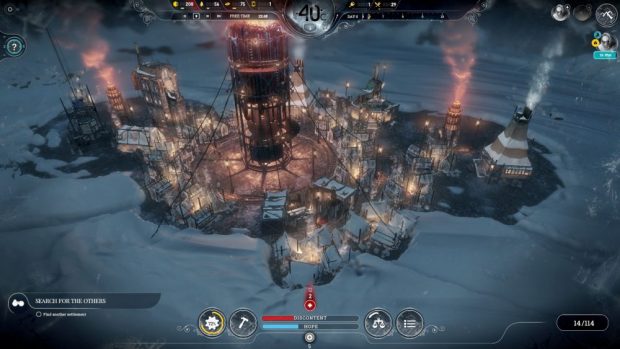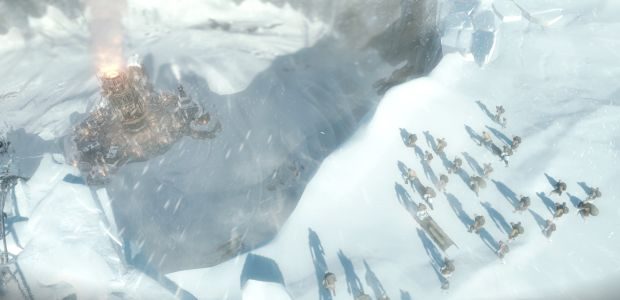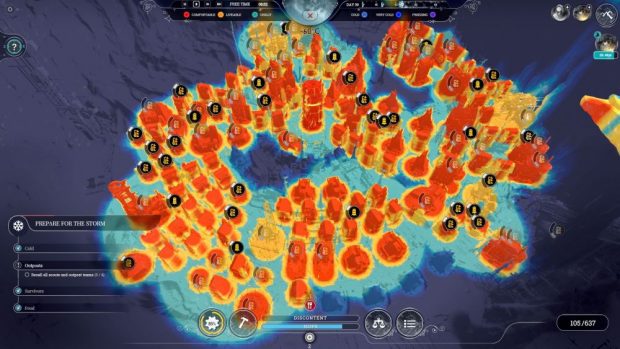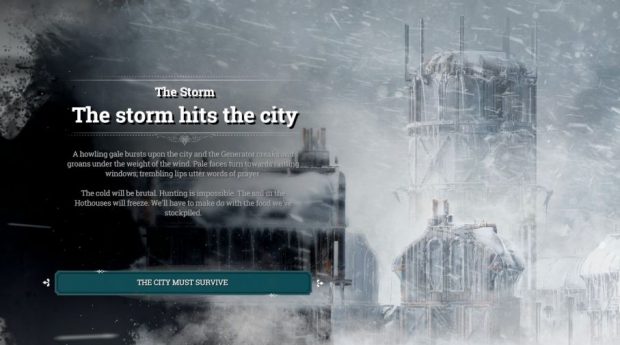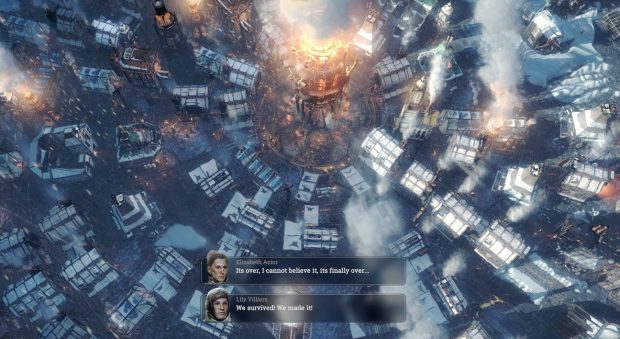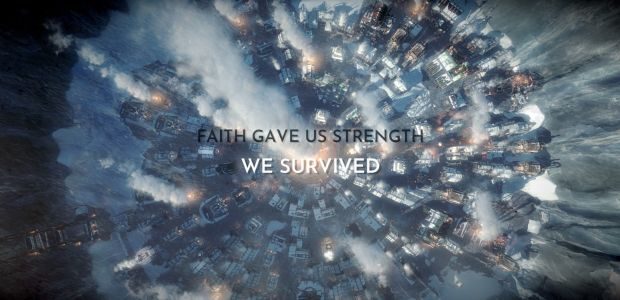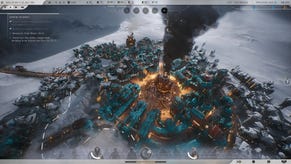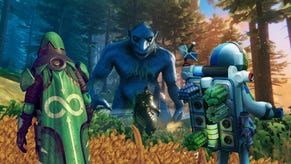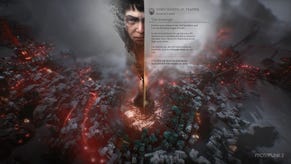The RPS Verdict: Frostpunk
A bit nippy
Snow and coal simulator Frostpunk has gripped a few of us in its cold prosthetic claws over the past week. We especially like the warm feeling it gives us when you switch to heatmap mode and see the temperature rise in your new houses. But it also isn’t the steam-powered morality trolley it often tries to be. Here, city bosses Katharine, Matt and Brendan discuss how they kept their people alive and whether they’ll play again. SPOILER WARNING: Cold details of the story await.
Brendan [sniffing]: Hello, friends. Hello.
Katharine: Were you also playing Frostpunk into the early hours, Brendan? Did you feel the cold creep into your weary, weary bones?
Brendan: I might’ve been. I built a big church and now my people want the priests to be in charge of crime and punishment.
Matt: What could possibly go wrong?
Alice [interrupting]: You'll want a medium-sized church, they're only into singing and communion wine.
Matt: So far I’ve bought it, played for 15 mins, then realised I was too tired to grasp everything and stopped so my people wouldn’t suffer because of it.
Katharine: I've started building some churches as well, but only because the 'Faith and Spirituality' path for dealing with everyone's sudden depression over the whole 'Actually, everyone is dead' revelation sounded slightly less woolly than the ambiguous 'Order and Discipline' route. Does Order and Discipline mean I'm going to have to start training police or gang bosses who simply have stern words with their fellow workers? Who knows. After accidentally letting a third of my survivors die in the first 15 minutes because I didn't know I could turn the generator on, I needed as many non-police workers as I can get.
Matt: I’m glad I’m not the only one who did that!
Katharine: I sent my people to go and gather coal, to stockpile 200 like it said, and only realised after people started dying that, 'Oh, I could have turned on the generator almost as soon as I'd started collecting it'. That might have something to do with the imminent rebellion I'm now facing. Soz guys.
Matt: Did you restart?
Katharine: No, I didn't. I probably should have, as I also didn't know you could build streets until about 30 minutes in, and it was even later when I discovered they didn't have to snake around existing buildings. All this time, my workers could have been walking on actual roads to gather their coal, wood and steel. Instead, they were forced to wade through the never-ending snow drifts.
Matt: Hah, yeah I'm abandoning my dudes to their frozen fate.
Katharine: Things got a bit better after that initial, accidental cull, though, so I carried on, only for it to go horribly wrong again about an hour later when a minus 70 degree cold snap meant I had to hurriedly research better heating. Luckily, I think I'm coming through the other side now. It's pretty grim, but it's still a lot less bleak than This War of Mine.
Brendan: My place began fine. Only 2 people died in the founding of our city.
Katharine: Haha, you're doing far better than I. My cemetery is stuffed with about 70 so far. At one point, someone seemed to be dying every single hour. I don't think things are improving either.
Brendan: To be fair, we did have to dig up the bodies after burying them the first time. Because I wanted the space.
Matt: Awkward.
Brendan: And then a woman started crying because she saw her frozen dead husband again.
Katharine: Awks.
Brendan: He's way outside the heatzone now. She can visit him any time she likes. In minus 60 degrees.
Katharine: When I built my cemetery, I had a small boy sit there all night looking sad.
Matt: Jeez, this game. I'm guessing you can check the name on tombstones? He must have had someone there.
Katharine: Yeah, it was his mum.
Brendan: The snow pile has no names.
Katharine: You monster, Brendan.
Brendan: No names, just future organs. It's like a big fridge. Keeping all the good bits fresh.
Matt: Right, I’m going to go and stock my own fridge full of organs. I’ll be back.
Katharine: Did you conscript all your children to go down the coal mines, Brendan? Because judging by the tone of our conversation, I can imagine that's something you probably did.
Brendan: No, they did work in the kitchens and had a jolly time collecting coal from piles on the surface, but I didn’t throw them down the mines. In the book of laws, that’s where I stopped developing the “children as a workforce” idea. I was keeping the “weins do all jobs” law in my back pocket as an emergency measure, a backup plan if my workforce was suddenly stricken down by sickness or a nasty event. But in the end, the kids were all right.
Katharine: I stuck my kiddies in a children's shelter and made them apprentice medics, thinking that would be a way to ease my very, VERY limited supply of engineers, but it WAS NOT.
Brendan: If there was a cold snap and I couldn't heat the gathering posts, the city's children would usually get relieved and I'd replace them with workers, if possible. The church says they are our future (they don’t really say that in-game, but I like to think they are that sort of church). This highlights one of the game's flaws, I think. Mostly, it's about moving workers around, fiddling with numbers. I found myself having to make my own fun much of the time, as far as the humans were concerned. I basically had to imagine “oh no, those steel workers have been working 14-hour shifts for days, they must be exhausted” and act on that impulse, almost against the system of numbers going up. In other words, a lot of the impactful, human stuff was just my brain filling in the blanks.
Katharine: Because I continue to have such a low population, one trick I've developed is to rejig my hunters when they return in the morning and put them straight back to work on resource gathering. Then, just before the work bell tolls, turn them back into hunters. I'm not actually sure whether this is an effective tactic, or whether I'm actually just driving everyone to an early grave by making them work 24 hours without technically enforcing the actual 24 emergency shift button.
Time-travelling Matt: I’m back, and I’ve made it all the way through the blizzard. I avoided pesky church-meddling by going down the Order and Discipline path, which does indeed involve policing your folk with guards. Also torture.
Brendan: Heathens.
Matt: Alive heathens! Mostly. The only people I wound up losing were a guard that got himself stabbed chasing a thief, and a suicidal poet.
Time-travelling Katharine: I haven't made it through the blizzard yet, but I have got to the point where I've been forced to create church police like Brendan as my rowdy, discontented Londoners were getting far too bold. First they started stealing supplies, then they stabbed one of my priests.
Brendan: I'm glad to see you've both invented time-travelling alter egos, rather than admit we started this feature last Thursday and are finishing it today. But never mind that, I want to know what options opened up for Matt the Fash in the law books. What other buildings can you make if you go the authoritarian route?
Matt: Well, if I’ve learnt one thing from Frostpunk it’s that Propaganda Centers fix everything. Building that not only gave everyone a massive initial boost to hope, but let me send messages to their doors every couple of days telling them everything was fine. Later on I recruited some people as informers, which help me put more people in prison. Wait, did you guys not get prisons?
Brendan: The only prison in my game was when the mine collapsed on 30 workers and I left them there to die.
Matt: Ah. The prison in my game was one where the inmates got beaten up so they’d all become nice, productive members of society again.
Katharine: Man, I should have gone down the prison route. That would sort my nearly 70% discontent / 10% hope problems right out.
Brendan: It’s interesting that the two routes are essentially the same, then. The religious folk get a confessional, public shaming ritual, which has the exact same effect. And it sounds like sermons boost hope in the same way propaganda does. When you’ve only two ticking metres to concern yourself with, the limitations become clear. Everything else is just thematic dressing. I’m not bothered by that, because it’s so short and has enough flavour to keep me happy, but it’s definitely a sign that the game is less complex than it often appears.
Katharine: I haven't got as far as being able to build confessionals yet, but I do wonder whether one hope-booster is more effective than the other. In my experience, the sermons do very little to help improve the mood, but maybe that's because I'm making so many other terrible decisions. I also find it hilarious that whenever people go to listen to a sermon, the game lists them all as being 'Gravely ill', presumably because they're out of action for a bit.
Matt: My propaganda post did only tick the hope metre up by a little each time. Thinking about it, I probably owe more to some well-placed guard towers and fighting pits - I got a neat permanent boost for making it so that everyone lived near one.
Brendan: How many people survived the final onslaught huddled in your hell city, Matt?
Matt: I didn’t lose a soul, AND I took in every last one of those sickly refugees. I don’t need no church to be a saint. Apart from the torture.
Brendan: I lost 45 people in the last few days, because the struts of the coal mine started to deteriorate. I was given the choice: send men to fix them at the risk of death, or abandon the most lucrative depths of the mine, dropping my coal output by EIGHTY PERCENT. It was the only pop-up decision in the game that made me pause for longer than a few seconds.
Matt: I don’t mean to be Boasty McBoastface, but my advanced automated steam mines just laughed that 80% reduction off. It might not be the case in the other scenarios, but in the main one you’re rewarded for ignoring big parts of the tech tree. I decided early on I was only going to research and build the most efficient things, and that meant I only had a few resource scarcity scares.
Katharine: At the rate my city's deteriorating, I don't think I'm going to see this final snow fight.
Brendan: Wait, what’s your city called? Mine was 'Bit Nippy'. At least, that’s what I put on the save file.
Katharine: My first manual save was dubbed 'Bleak House', which then turned into 'Bleaker House', 'Bleakest House', 'Slightly less Bleak House' and 'Even Bleaker House'.
Matt: Mine was ‘Bloody Londoners’ for most of the game.
Brendan: Right, here’s the important question, I think. You’re both at different parts of the game, but do you see yourselves playing through another scenario? I don’t think I’ll go back to it. I liked it, but I feel like I got my fill, like I’ve seen all the metre-balancing it has to offer. I enjoyed the city-building, and the tension of the last few days was great. But now I’m on the other side, the weather is clearing, and I’m happy to leave Bit Nippy behind.
Katharine: I'd definitely like to try again, if only to fix some of the stupid things I did in my first playthrough. Like remembering to turn the generator on and not killing 30 people straight off the bat. I'd also like to see if I can organise my resources better, making things more efficient and better planned-out, with things like proper roads and stuff.
Matt: I was thinking about replaying the main one, but probably won’t now that I know the Faith path is so similar to Order. I’ve started the next scenario, but it’s way harder and I’d forgotten how uncomfortable I feel when things are threatening to spiral out of control - which is odd, because that’s arguably when a game like Frostpunk is at its best.
Brendan: I think there’s definitely more satisfaction to be had in making an efficient, pretty city here, as opposed to indulging the “losing is fun” school of thought. I can imagine plenty of folks are currently working out how to make dystopian machine-like cities, the likes we sometimes see from masters of Sim City.
Anyway, let’s wrap this Verdict up, like a small child in a woolly scarf. Are you both happy to recommend it to all those fans of snow we cultivate here at RPS?
Katharine: Definitely, as long as you're prepared for some gruelling moments of number-crunching and throwing all humanity to the cruel, bitter wind.
Matt: I am, though like both of you I’d recommend it as a flavourful city builder rather than an engine for generating interesting moral decisions. I was expecting some of those to give me pause, but without a personal attachment to any of my citizens I was surprisingly happy to, um, become a fascist.
Brendan: A GODLESS HEATHEN, you mean.
Matt: I’m a saint, Brendan.
A Saint.
Frostpunk is on Steam and GOG for £24.99/$29.99. Check out Xalavier Nelson Jr's Frostpunk review for a more detailed analysis of its systems.


